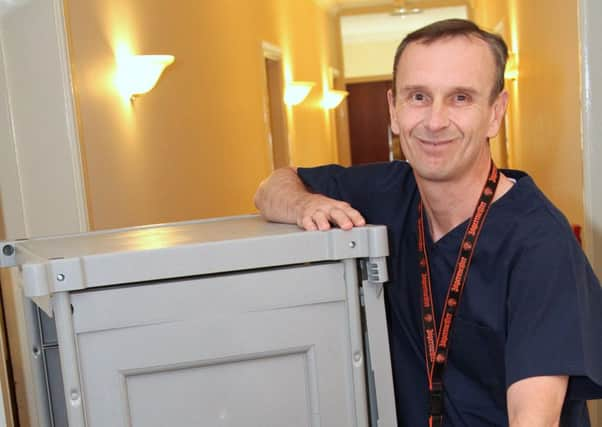Ready, able, willing


Paul, 47, now has a new job as a housekeeper at Willerby Manor Hotel, near Hull.
“I’m physically active in my new job as a housekeeper, making beds, restocking rooms and ensuring guest facilities are cleaned and prepared to very high standards – I take pride in my work and it means I can build up my strength even more,” he says.
Advertisement
Hide AdAdvertisement
Hide Ad“Just as important, it’s helping me regain my confidence, which was shattered by my experiences and the realisation that finding employment again was going to be the hardest job.”
Disability employment specialist Remploy supported Paul in his quest for a new job.
Advisers helped him prepare for work in practical ways, including writing a CV listing his many skills, teaching him how to respond in job interviews, and exploring the kind of roles that would make good use of his previous experience.
“It’s not the kind of job I had ever considered before, but it’s giving me everything I need – it’s keeping me fit and I enjoy really interesting working days,” says Paul.
Advertisement
Hide AdAdvertisement
Hide AdIt is almost six years since the passing of the Equality Act 2010, which gives disabled people wider rights when it comes to employment.
According to the Department for Work and Pensions, there were over 11 million people with a limiting long-term illness, impairment or disability in 2014. The most commonly-reported impairments were those that affected mobility, lifting or carrying.
According to the Labour Force Survey, disabled people are now more likely to be employed than they were in 2002, but they remain significantly less likely to be in employment than non-disabled people.
Government figures suggest there is a 30 per cent gap between the UK employment rate of disabled and non-disabled people – a figure the Conservatives want to halve.
Advertisement
Hide AdAdvertisement
Hide AdIn Yorkshire, over one in five working-age people are classed as having a long-term disability, including those with a mental illness such as depression, which substantially limits their day-to-day activities or the kind of work they might do.
In 2015, 48.6 per cent of working-age disabled people in the region were in employment compared with 78.8 per cent of working-age non-disabled people.
Matt Reed, employer services director at Remploy, says: “Over the last couple of years I have noticed a difference in attitude for employers, and the aspirations of disabled people have also changed.
“More employers are realising that having a diverse workforce has a real benefit.
Advertisement
Hide AdAdvertisement
Hide Ad“But also disabled people have realised their worth and they have a greater drive to build their career in mainstream employment, and they are creating a level playing field. They are more demanding now, which is great for creating change on both sides.”
Remploy works with a number of employers in Yorkshire, including Asda, Tesco, Morrisons, outsourcing firm Mitie and banks including Lloyds and Santander.
Over the last 12 months it has supported over 2,000 people into work across all sectors and worked with more than 200 employers.
Holly Wilkinson, 21, who has autism, was unemployed for two years before she was given the career start she yearned for at Northallerton’s Marks & Spencer store.
Advertisement
Hide AdAdvertisement
Hide AdShe was referred by her local Jobcentre Plus office to Remploy which then helped her secure a work placement with M&S through its Marks & Start initiative.
Holly says: “Before starting with M&S, I spent most of my time at home feeling very low and demoralised. Most people of my age want a job and I was no exception.
“However my disability, and how others reacted to it, made me feel like I was at the very bottom of the pile. I had amassed so many rejections that I thought I would never get the chance to prove that I’m just as capable as anybody else of doing a really good job.”
Holly’s month-long placement turned into a temporary three-month job. Then, on what she believed would be her final day, she was offered a permanent job as a customer assistant.
Advertisement
Hide AdAdvertisement
Hide AdStore manager Vicky Stephenson says: “Employing Holly was an easy decision to make. She developed from a shy and introverted individual into somebody who is confident and really wants to do well.”
Holly adds: “Having a job means everything to me. I have a reason to get out of the house and I’m proud to tell others that I have a job. Finally, I have a future to look forward to, and that means more than anything.”
In 2013, the Government launched a campaign to encourage employers to think positively about the prospect of employing disabled people.
Disability Confident aims to convince businesses that employing people with disabilities isn’t just the right thing to do, but that it also makes sound business sense.
Advertisement
Hide AdAdvertisement
Hide AdMr Reed says: “We need to make sure we engage with as many employers as possible and show them that there are simple solutions to the problems they may envisage when employing someone with a disability.
“We can show them that the benefits of working with disabled people far outweigh any effort needed to achieve that.”